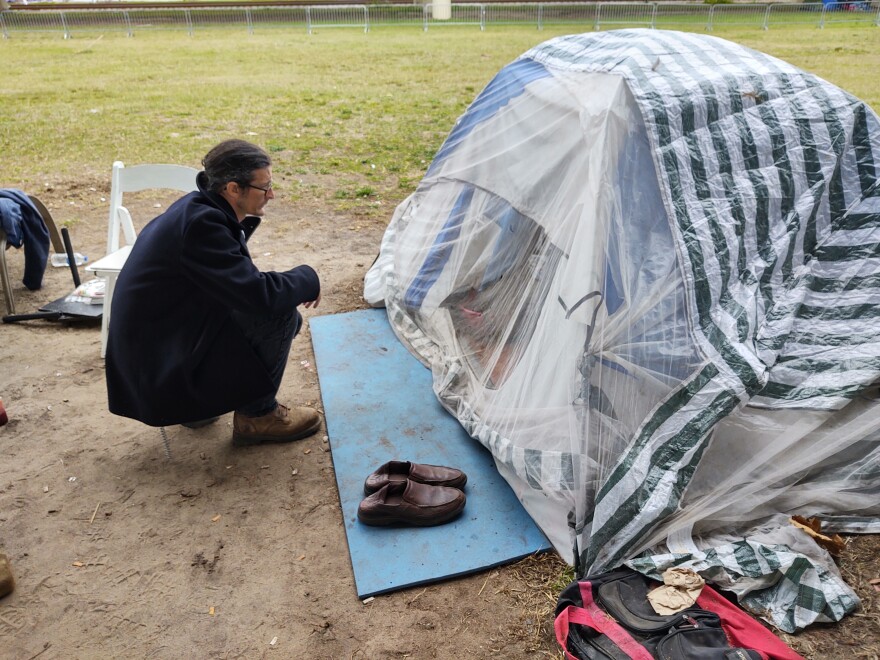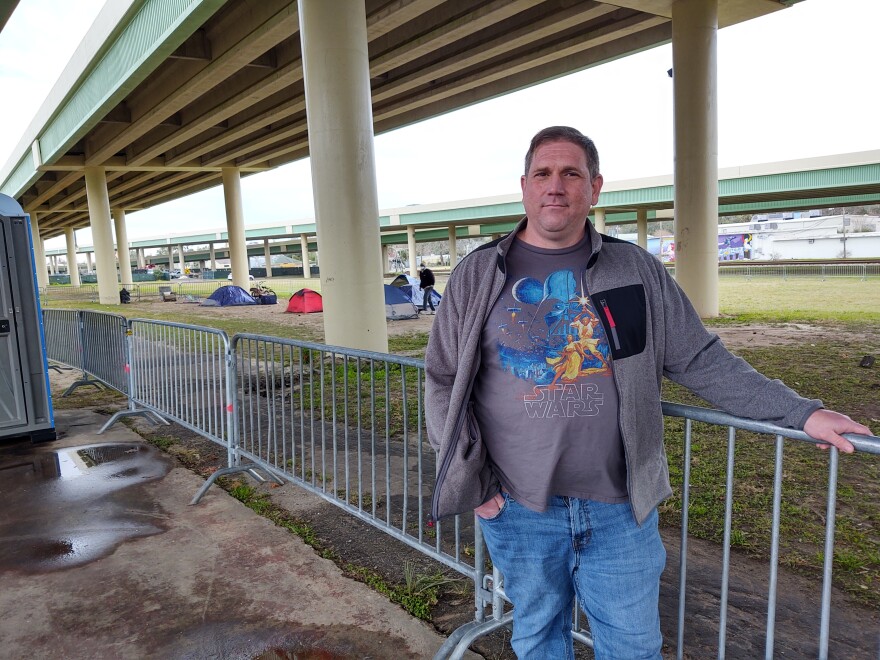The City of Pensacola is holding off on plans to close the Hollice T. Williams Park under Interstate-110 and remove the homeless camps that have recently sprung up. Those homeless individuals can now stay until March 1. Meantime, the community has rallied to provide some on-site amenities, while advocates work to find housing.
“Part of those better accommodations we’re providing here are port-o-lets, handwashing stations and garbage pickup and giving them a place where they can set up a tent,” said Michael Kimberl, director of the Alfred Washburn Center and director and co-founder of Sean’s Outpost, a homeless camp in Satoshi Forest.
Kimberl says addressing the current needs of the campers under the interstate has been a joint effort.
“The city handled the port-o-lets and handwashing stations. The organization Opening Doors Northwest Florida covered the dumpsters and St. Vincent DePaul is handling the tents, tarps and sleeping bags for the residents here.”

At the time of his Friday visit to the camp beneath the I-110 underpass, Kimberl was on his way to pick up more such supplies to help the campers endure the cold, windy, rainy weather.
On this day, about a week after city code enforcement gave notice to vacate, the number of campers here had reduced by about half of the 30 or so that had pitched their tents. Some left immediately.
“Because they’re law abiding citizens as best they can be and didn’t want any trouble,” Kimberl explained. “The rest had no where else to go, so we set up this cordoned-off area and I imagine we’ll probably start seeing some that vacated coming back once they hear there’s a place they can be. That’s yet to be seen, but we’re hoping it doesn’t grow too exponentially. But, it probably is going to get a little bit larger.”
Kimberl has known the area to have as many as 50-60 homeless people at any one time, because it’s an attractive spot to set up camp.
“It’s a great location for them directly behind Loaves & Fishes,” he said. “They serve a breakfast every morning during the week, so it’s very convenient for the people in this area to just get up and walk over and have breakfast in the morning and then start going about their day on how to get out of these situations.”
Right now this site under the interstate is also a secure one, with fencing and no immediate threat of removal by the city.
“It’s safety,” declared homeless advocate Walter Arrington. “If you sleep every night and you’re afraid somebody’s going to come in your bedroom and steal everything you have, that would wear on you.”

Arrington experienced that feeling during the four-year period that he was living on the streets. Now, he’s working on behalf of the homeless and doing his part to watch over this particular camp site throughout the day and evening.
“We’re not police, but a presence to give these clients a sense of safety,” he said. “And, the hardest part about being on the streets and getting anything accomplished is that you’re always moving around and that nine times out of ten, you don’t have a cell phone, so your case manager can’t get a hold of you. So, with everybody centralized, we can bring services to them and we can get some work accomplished.”
“We’re doing intakes and assessments so that we can identify what their needs are and what they individually have as their own personal resources,” started Serene Keiek, director of marketing for Opening Doors Northwest Florida, the continuum of care for homelessness in Escambia and Santa Rosa counties.
“Do they have income? Do they have SSI or SSDI? What is it that they have that we can work with,” she asked.
As part of the process, she says they’re also working to determine what the individual’s need to enable them to get into stable housing or provide other options for those who prefer to camp.
“So, we what we’re trying to do is now put in an evaluation of who wants to have a home and what type of housing or program is available and what type of resources are available,” explained Keiek. “That’s been the main stretch, trying to find available housing options during this COVID pandemic, post-Hurricane Sally time that we’re facing.”
This double-whammy means there are fewer shelter beds available (due to COVID restrictions) and a shortage of housing, especially for many of the individuals who are on a fixed income of around $700 a month.

“We’re also looking for a housing option that they can afford, even if they room-mate, because we do roommate compatibility assessments to see if there’s somebody else they’d like to room with and share the rent,” she said. “The other option is to have houses donated to Opening Doors, so we can place more than one person into a home, even if the house is donated for just one year.”
Keiek says a citizen donation is allowing them to place some of the 15 or so people now camping under the interstate. Three men are going to one such home, while another house has been secured for three women.
One of the individuals waiting to hear back after his interview with Opening Doors is James Smith.
“That went great! They said maybe about a month or less, they should have a placement for me,” Smith of the pledge to have a place by the end of February.
Hunkered down in his tent, Mr. Smith spoke about his long experience with homelessness over the years. Limited by income, he’s lived off-and-on with roommates and family, including his children and brother before he died.
Now, again in 2021, he’s hopeful that he’ll have a new place to live before the city’s grace period is up.
“Yes, very hopeful,” Smith proclaimed. “They have some great people; they’re out to help you, not to hurt you. You got to work with them and hang on, just ride with them, be truthful and hang in there. They’ll get you some help. You got to want it though.”
Although he pointed out that he’s adapting to homelessness as a part of his life, Smith conceded he really does want the help, “very much so,” he said.
With our interview ending, I wish Mr. Smith good luck in getting a place to stay.
“Yes, ma’am. And, thank you very much,” he responds.


